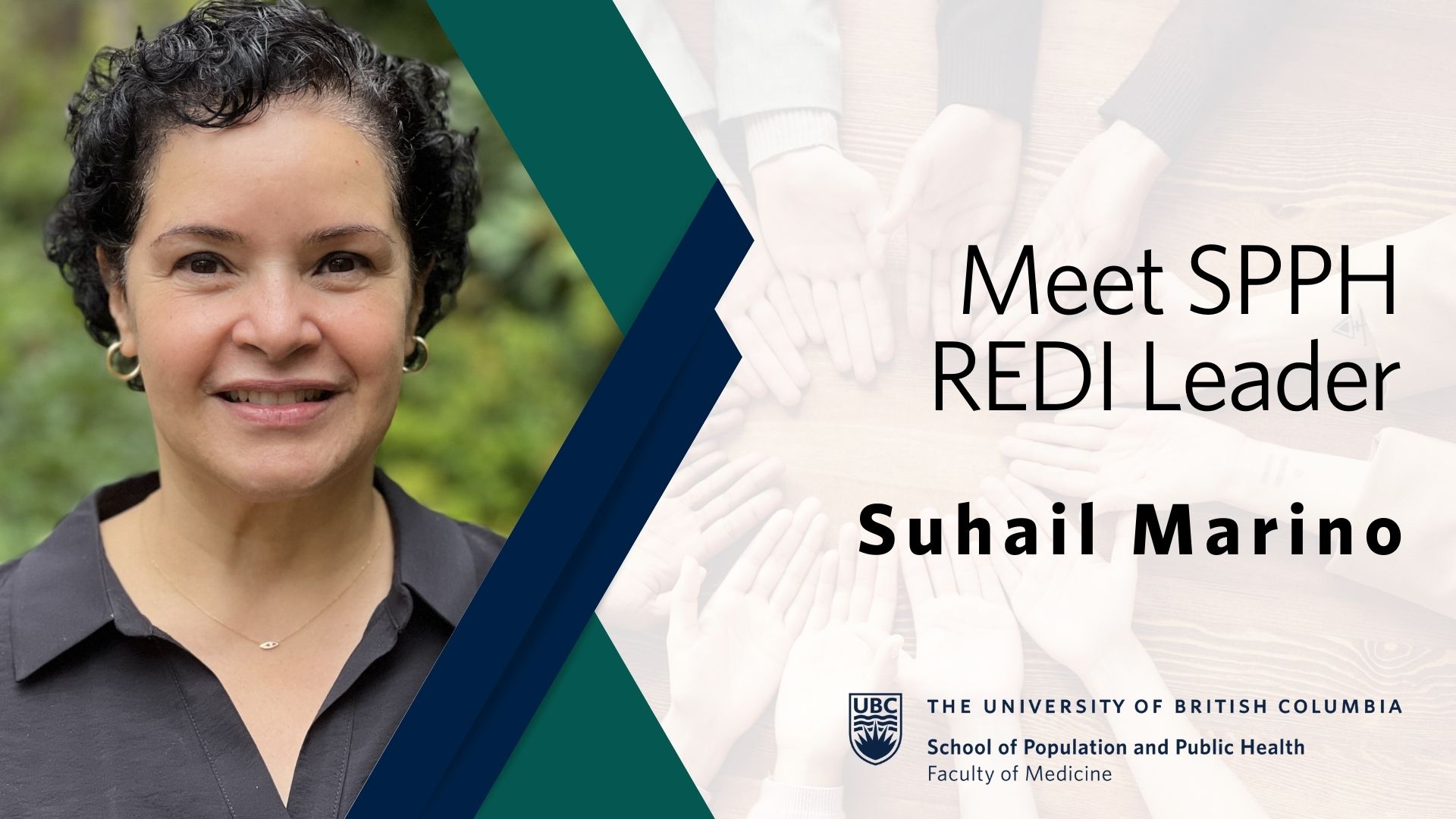
Meet SPPH REDI Leader: Suhail Marino
In this REDI Leader spotlight, we speak with Suhail Marino, Program Manager and Privacy Officer, Partnership for Work, Health and Safety.
Tell us about your background and how your identities and/or life experiences have shaped your work at SPPH?
I believe that my Afro-Latin background, combined with my social justice and activist identity, along with my experiences living in various low-income countries in South America and high-income countries in Europe, have brought a rich and multifaceted perspective to my work at the School of Population and Public Health (SPPH). My commitment to social justice drives my passion for addressing health inequities and fighting for the rights of marginalized groups. It is important to me to ensure that my work in public and occupational health research addresses respect, equity, diversity and inclusivity.
I try to bring a global perspective to my work, trying to understand and help address health and occupational health challenges from a broader, more inclusive viewpoint, considering different health and occupational systems and cultural contexts. I also think my activism helps inform my approach to policy-making, ensuring that the voices of underrepresented communities are heard and considered in public and occupational health policies.
In my personal time, I dedicate myself to raising awareness about various injustices locally, around the world, and especially those affecting my birth home country, Venezuela. I believe we all have a role to play in fighting for human rights, justice, and equity to ensure everyone has equal opportunities and is free from discrimination. Every individual deserves to be treated with dignity and respect. I hope to contribute to efforts that create a fair society where everyone can thrive and reach their full potential.
I am an active member/ volunteer of STAND UP FOR VENEZUELA. This is an organization of apolitical Venezuelans, who are concerned about this country’s situation. The organization supports a democratic Venezuela and upholds the fundamental principles of a democratic system: 1) Human rights; 2) Justice; 3) Separation of powers.
On the weekend, you will find me outside participating in local and international events denouncing human rights violations in Venezuela and around the world as well as any acts of injustice in our community!
What motivates you to engage in REDI work at SPPH?
Global and local events in the past 5 years have brought deeper awareness of the racial inequities and disparities that exist within our culture, policies, and institutions. Negative outcomes for the underrepresented and marginalized individuals and groups continue to persist. I believe that we need to have open and honest discussions that can create meaningful action, leading to systemic and behavioral change that consider differences in lived experiences, perspectives, and realities. I think it is very important to work on REDI-related issues and adopt best practices at SPPH and I see the role of anyone working in this sphere, to build a respectful community where all diverse individuals feel safe, valued, respected, and welcomed. I am hopeful that SPPH can create a space for students, faculty and staff to engage and that it can provide a safe, inclusive and equitable academic and research environment for everyone.
Can you share a project, program, teaching/education and/or research initiative(s) that you have been involved in that promotes REDI at SPPH?
I am currently working on a project in the food and beverage sector in B.C. that is trying to understand how workers experienced bullying, harassment, and/or violence at work in the province. We know that women (cis and trans), gender diverse, 2SLGBQ+ people, BIPOC and im/migrant people are disproportionately negatively impacted as workers in the food and beverage service sector. As we are living in a political and social environment that is becoming more and more polarized daily, with some groups viewing REDI initiatives as unnecessary, I hope that the findings from this project will be used to strengthen REDI policies and practices and highlight the need for these initiatives in our workforce/ society.
In our research unit, The Partnership for Work, Health and Safety, we have incorporated an EDI lens in our research projects and our team’s operational activities. Our team has annual learning events on EDI best practices and brings EDI experts to help us better incorporate these learnings in our research and our workplace practices.
What role do you see yourself playing in improving REDI at SPPH?
I see my role as creating opportunities at SPPH to discuss important organizational issues that highlight that not all SPPH employees or UBC potential employees have access to the same resources, and in fact, some actually face practices and processes that inadvertently reinforce inequities. Respect, equity, diversity and inclusion are principles that are very important to me, and I think all staff need to bring a voice to these issues that helps better support people of color and other minorities at all levels, that helps remove barriers for recognition and to overall fair treatment.
What advice do you have for those interested in getting involved in REDI initiatives at SPPH?
Getting involved in REDI initiatives at SPPH is a great way to contribute to a more respectful, inclusive, diverse and equitable community. I invite all at SPPH to participate in events, workshops, and seminars organized by the REDI Committee. I encourage all to volunteer and help make positive changes at work.
The REDI Leader feature is a space that highlights diverse voices of those leading educational reforms, research projects, and/or workplace initiatives at SPPH with the aim to foster a respectful, equitable, diverse, and inclusive environment. The perspectives shared are those of the individual(s) and do not necessarily reflect the views of UBC, SPPH or any of its constituent units.